Film Name: 人生大事 / Lighting Up The Stars / Funeral Family
This weekend, a new Chinese film of fairly good quality was released, and after several rounds of screenings, its word of mouth and momentum has accumulated to the point that it has the appearance of a “small explosion”, which is Lighting Up The Stars.
The movie takes the relatively rare funeral industry/undertaker as the entry point, and uses the father-daughter relationship between a “terrible big boy” and a “cute little girl” as the facade, and renders a good drama that is both funny and good for crying.

Although Lighting Up The Stars is not ideal in terms of structural design, and there are some problems with the matching and presentation of the thematic lines, as a drama movie for the general audience, the movie is very solid on the whole, with avant-garde themes, down-to-earth characters, sincere feelings, and also full of life, making it an appreciated and watchable masterpiece of Chinese cinema.
After watching the movie, I really have some “life except death is no big deal” feelings and calm.
[WARNING: Spoilers to follow]
Right off the bat, Lighting Up The Stars owes a lot to its subject matter and characters – in other words, as long as you don’t intentionally mess with the film, it’s already halfway there.
The funeral industry has something to do with all of us, but it rarely appears in our daily discourse, because we are used to keeping “concrete deaths” secret and hidden, and the protagonist, Mo San-mei (for the sake of everyone’s habits and San-mei’s feelings, I’ll call him “San-ge”), is also a funeral director, and he’s a woman who has been in the funeral business for years. “) is also a released prisoner, a young man in his thirties who is living in a state of confusion – a story about a “prisoner of labor who does business with the dead”, destined not to appear in the mainstream of society! The story of a “dead man’s business” is not destined to appear in the mainstream of society.
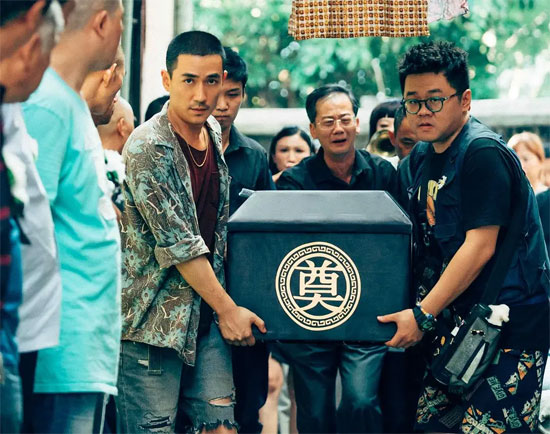
Unlike the “Chinese version of Bunny Drop and Departures” that some fans have suspected, Lighting Up The Stars has no Japanese genes, it is a localized story with the joys, sorrows and smokes of our land.
It didn’t take long for Sango to convince me that the character: lighting cigarettes with yellow paper money burning in a fire pit, chewing gum and skillfully wiping the body of the dead, and undressing himself in the face of accusations of “theft” by the proprietor of the house …… is just an oily bastard who is a bit of an actor but not much of a man. The pursuit of the oil bastard.
Let such a man with many defects and a problem girl to produce intersection, and then be “redemption”, in fact, quite old-fashioned, the movie’s creativity only here is the biggest short board.
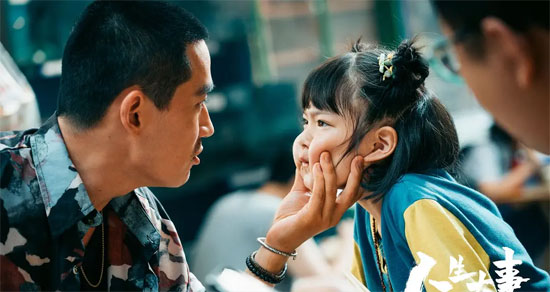
Luckily, Lighting Up The Stars is not too bad in terms of execution. Despite the fact that Wu Xiaowen, the wild girl in the early part of the film, repeatedly gets into trouble and yells “Grandma, Grandma, Grandma, Grandma,” making the narrative slightly out of control with her overly intentional performance, the young actress Yang Eun-Ah’s “Little Nezha” is too energetic. However, the young actor Yang Enzha’s “Little Nezha” image is too full of spirit, and with the unexpected events as a supplement, the transition is smooth at last.
There are two main threads in the movie, one is the complex feelings and attitudes of Sango towards her father and the family funeral business, and the other is the emotional connection that Sango, Jianren, Baixue, and others establish with Xiaowen. There are a lot of intersections between the two threads, and these are also the best parts of the movie.
Sango’s profession enriches Xiao Wen’s spiritual life, and Xiao Wen’s lack of understanding of death brings a lot of fresh changes to the “Heavenly” birthday suit store.
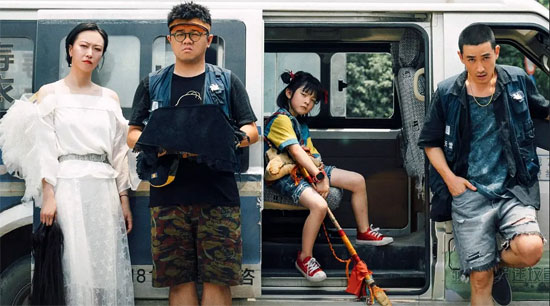
For example, Xiaowen learned that the pink urn was prepared for a child of the same age as his own, and then painted on it, she knew nothing about the urn’s rich “properties”, and by the time Sango and their discovery was too late.
Can’t wash it, can’t change it, Sango can only hard to “spoil the waste box” to the parents of the deceased, but unexpectedly the other party is particularly satisfied, because their daughter died before she was born favorite painting, so this accidental “spoiled” as the The parents of the deceased were very satisfied with the accidental “abuse” because their deceased daughter loved to paint before she died, so they regarded it as an exclusive customization with good intentions.
It is also like Xiao Wen for the lack of money for the third brother pulled a big business, an old man who has no love for life, want to die before they do a grand funeral …… Originally for the living to do the funeral is a taboo, in any case, not feasible, coincidentally, the old man dares to want to be willing to spend money, Xiao Wen dare to do the introduction of the mixed miserly third brother also really dare to do.
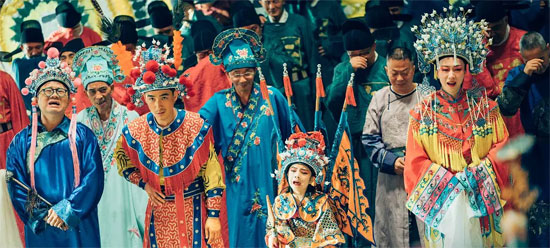
This “spend a little money, do big things” funeral a little sad atmosphere, but also caused the old man’s family to fight, and finally everyone together into the police station, it looks more like a farce …… can be learned that the old man’s children in order to the family demolition money and has been quarrelling! The audience realizes that there are more discouraging things in the world than death, and that it doesn’t seem so treasonous to hold a funeral for a living person.
Similar cognitive differences contribute to most of the laughs in Lighting Up The Stars, the most iconic scene, and the one I laughed the most at, is the kindergarten parenting class, where Xiao Wen performs “Wrestling Pots and Hanging Filial Piety” with a neighbor boy.
In the eyes of adults, children in front of their own performance “filial son crying mother” is simply curse their own early death, even if there is a “childish” aura will not be comfortable …… But in the eyes of children However, in the eyes of a child, the funeral ceremony of the flowers, crying and other content itself is very beautiful and fun, but just follow the example, and where is the taboo? (Of course, Xiaowen apologizes with Sanjiao later on, which feeds into the father-daughter bonding line.)
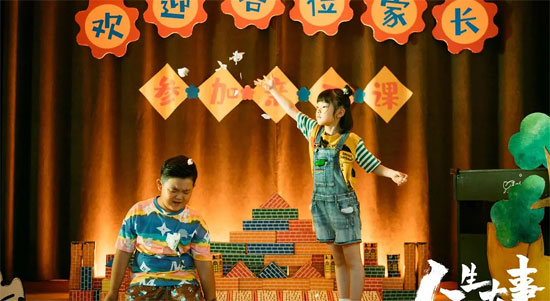
I heard that director Liu Jiangjiang’s family elders are carpenters, and his childhood aesthetic enlightenment began with beautiful coffins, while producer Han Yan, from “Go away Mr. Tumor”, “A Little Red Flower” to the current “Lighting Up The Stars”, is obviously with the director of the “end-of-life care” humanistic sentiments to carry out. “The movie offers a great opportunity to see the human side of hospice care in action.
This movie provides a good opportunity for “death education”, not only to dispel the charm of death and funeral, but also to make the corresponding positive and respectful, especially the undertaker called “the man who planted the stars”, is undoubtedly the most romantic metaphor.
Unfortunately, from the middle of the movie onwards, the two main lines become more and more fragmented, and it is difficult to form a synergy, not to mention that even the minimum plot advancement has become hard (often relying on a phone call to change the scene), resulting in the story that should be tearful with laughter, in the lack of continuity at the emotional level and a sense of wholeness.
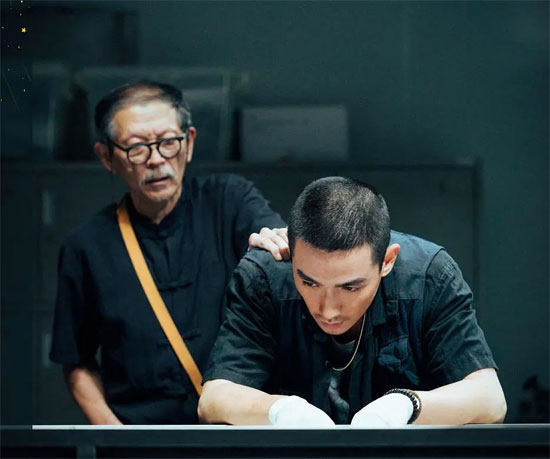
On the one hand, Sango keeps reacquainting herself with the phrase “The job of a mortician is not for the competent, but for the incompetent.” This sentence.
For a long time, Sango was ashamed of this profession, and even blamed the family business for his misfortunes such as lack of money, imprisonment, and cuckoldry. It was not until many experiences after his change of heart that he, under his father’s tutelage, gradually realized and understood the doorway, the burden, and the saintly heart of an undertaker.
On the other side is the relationship between San and Xiao Wen, from hating each other, to starting to rely on each other, and finally to being inseparable.
Those who have children, especially daughters, may feel this even more: although not everyone applies to this theory, there are indeed many people who were originally muddleheaded, but after being “chained up” by someone or something, they become a better person, just because there is something in their hearts to hold on to.

So it’s better to keep the two threads separate for the rest of the movie.
There is an implicit theme in Lighting Up The Stars of the inheritance and abandonment of the traditional funeral service industry – the “newness” brought about by Xiao Wen has already been mentioned, but the best change of all is made by the father and son team of Mo and Sango. The best change was made by the father-son team of Mo and San.
Most of the time, Lao Mo is a defender of the rules, which seems to symbolize the reluctance and helplessness of the tradition that will be lost, but in dealing with his own imminent death, he shows unprecedented pioneering: no mourning, no conventions, this is his own death, and he wants a different burial method, and Sango, because of this special test, will inherit the family’s rules and regulations, and go out on a new path of his own. his own new path.

Some people will think that the three brothers put his father’s ashes into the salute shot into the sky “ashes fly into the air” is an unthinkable unfilial thing …… But look at it from another angle, in the flying sky after the moment of splendor to return to the earth and sky, for a lifetime to see all of the death of the undertaker, not a very romantic home? a very romantic homecoming?
As for the growth of the protagonist, Sango, there are also traces to follow, the clue is his three times of crying – the first time is the self-abandonment after being scolded by his father, he cries for himself; the second time is to take the initiative to send away Xiaowen, and then suffered from friends’ rebelling and his father’s death, he cries for the pains in his life and the departure of his loved ones; the third time is to see Xiaowen, who has found his way back home, and cries with sorrow and joy. The third time is to see his own home to find a small text, mixed feelings of grief and joy, tears of pathos.
Since childhood, Sango has been accustomed to seeing death, and has long been unable to shed tears for the separation of life and death, so each cry is impressive, and when strung together, the emotions are in place.
I love the last two scenes of Lighting Up The Stars: Jian Ren and Bai Xue’s wedding, which is a walk from the wedding store next door to their own birthday suit store, Sango dissolving the bitterness of parting in a cloud of joy, leaving behind Xiao Wen’s birth mother, and finally the family of five looking at the cluster of stars in the night sky as if they have found the person they miss, speechless for a long time but at peace with each other.
Life in the world, in addition to life and death, are trivial.
Please specify:Anime Phone Cases » Lighting Up The Stars 2022 Film Review: there is nothing important in life except death